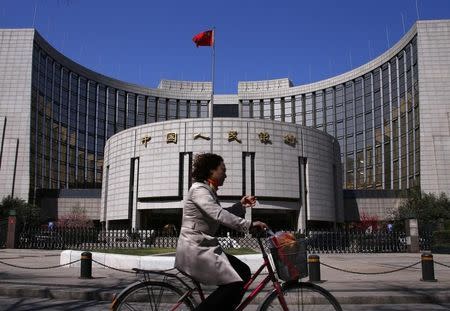China central bank seen playing safe as slowdown fans policy debate
By Kevin Yao and Benjamin Kang Lim
BEIJING (Reuters) - China's central bank is likely to hold its line against an interest rate cut even as growth slows to a quarter-century trough, as the politics of reform influence the conduct of monetary policy, government sources involved in internal policy discussions say.
The People's Bank of China (PBOC) faces growing pressure to cut interest rates to support growth, but fears that could fuel debt and property bubbles while denting Beijing's reformist credentials have reduced the chances of any quick moves, according to sources close to the leadership and at top think-tanks.
Top leaders, who have pledged to stick with difficult reforms and eschew short-term stimulus to prop up growth rates, fear any major policy easing such as a cut in interest rates or broad cut in bank reserve requirements could be read as signs of backpedaling, the sources said.
"The main problem is some people have drawn a parallel between cutting interest rates with strong stimulus," said a former central bank researcher who asked not to be identified.
"It's a bit hilarious when you link cutting interest rates – a monetary policy - to politics, but the debate shows divided views within the government," said the researcher, who now works for the government.
The policy tone reflects President Xi Jinping's talk of a "new normal", that China should adapt to slower but more sustainable growth after three decades of breakneck expansion.
Stimulus has become a toxic word in the country, which is still nursing the hangover from a 4 trillion yuan (403.24 billion pounds) spending package in 2008-09 that created a mountain of debt.
"Cutting interest rates is a major policy decision which is also very sensitive at the moment," said a senior economist at the Development Research Centre, the cabinet's think-tank.
"It will be the last-resort policy that cannot be used easily," said the economist, who requested anonymity as he is not authorised to speak to the media.
Government think-tanks advise senior leaders on policy and reform plans, and can help draft them, but they are not involved in the decision making and implementation.
SLOWING GROWTH
Data on Tuesday showed the world's second-largest economy grew an annual 7.3 percent in the third quarter, the weakest pace since early 2009.
That has the economy set to miss its growth target of 7.5 percent for this year, the first such miss in 15 years, and to post its slowest full-year growth since 1990.
"I personally believe interest rate cuts are needed, but top officials have signalled that they won't do that any time soon," said Yin Zhongli, senior economist at the Chinese Academy of Social Sciences (CASS), a leading government think-tank.
The central bank has made some targeted easings, cutting reserve requirements for smaller banks and injecting short-term cash into some banks, to direct credit to vulnerable sectors, such as small businesses.
In its latest step, sources said late last week that it was set to inject about 200 billion yuan of liquidity into some banks.
"The central bank may have exhausted its ability, although it has innovated many short-term liquidity tools," said Wang Jun, senior economist at China Centre for International Economic Exchanges (CCIEE), a well-connected think-tank in Beijing.
STIMULUS VS REFORM
Whether the PBOC should cut interest rates has touched off a heated debate among government economists and state media.
Last month, Xinhua news agency, the Communist Party's mouthpiece, ran a commentary saying those who expected interest rate cuts showed their distrust of reforms. The People's Daily, the party's leading paper, hit back by arguing that cutting interest rates could not be seen as the opposite to reforms.
The PBOC and the National Development and Reform Commission (NDRC), the top economic planner, debated for months earlier this year about whether the government should ease monetary policy and use stimulus to buoy the flagging economy, a source with ties to the leadership told Reuters, requesting anonymity.
After the economy slowed in the first quarter, the government announced a series of support measures over the following three months that boosted growth. But President Xi ended the debate in July by throwing his weight behind reforms as the driver of growth, the source said.
"The big change came in July when Xi spoke about the 'new normal'. The government decided to abandon stimulus and focus on reforms," the source said.
At a secret meeting in September, top leaders agreed to put reform ahead of stimulus and accept economic growth could come in below target, policy insiders told Reuters.
So the PBOC is likely to stick with its targeted policy easing in the coming months, the sources said. An interest rate cut is unlikely this year, although the door for a broad-based RRR cut remains open, especially if capital outflows worsen.
Some expect fiscal policy may play a bigger role in supporting growth to help relieve pressure on the central bank. Premier Li Keqiang has already unveiled plans to spend more on water conservancy, environmental protection and other areas.
"They are unwilling to cut rates, they'd rather resort to some stealth steps," said Xu Gao, chief economist at Everbright Securities in Beijing.
(story refiles to add dropped word in first paragraph)
(Editing by John Mair)




